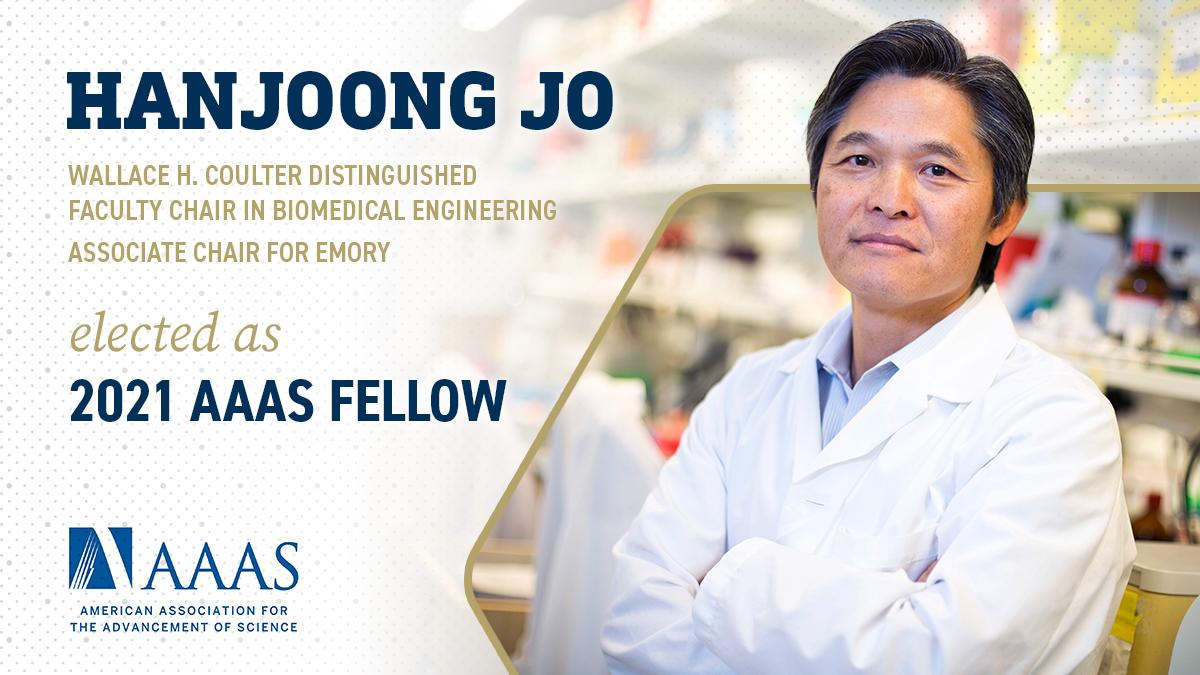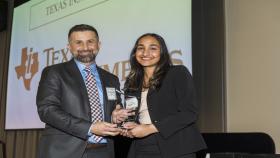The American Association for the Advancement of Science has elevated Wallace H. Coulter Department of Biomedical Engineering Professor Hanjoong Jo to the rank of fellow, one of the highest distinctions in the scientific community.
Jo joins the association’s most distinguished scientists for his contributions to atherosclerosis research, according to the citation from AAAS, as the group is more commonly known. The AAAS Council especially noted Jo’s use of novel animal models and cultured cells to discover the role of blood flow on endothelial cell dysfunction in atherosclerosis, a buildup of artery-clogging fats and cholesterol that can lead to heart attacks and strokes.
“I am deeply honored and humbled to be elected as an AAAS Fellow. This election recognizes my lifetime contribution to vascular mechanobiology and atherosclerosis by a distinguished group of AAAS Fellows, who are themselves accomplished leaders in broad [science, technology, engineering, and mathematics] fields,” said Jo, Wallace H. Coulter Distinguished Faculty Chair in Biomedical Engineering and the Coulter Department’s associate chair for Emory.
More than a decade ago, Jo’s research team created what has become a standard tool for atherosclerosis research called the partial carotid ligation model. It allows researchers to directly compare an artery with bad blood flow to one with good blood flow in a single mouse model. The innovation resulted in Jo’s lab directly demonstrating that disturbed blood flow can induce atherosclerosis in the presence of other risk factors, like high cholesterol.
Jo and his team have identified several genes and proteins that could be key to understanding why bad blood flow has this effect. Recently, his team has shown that flow-sensitive proteins called KLK10 (Kallikrein-like 10) and HIF1a (heat inducible factor-1a) are lost or activated, respectively, when blood flow is disturbed, leading to inflammation that is a critical step toward atherosclerosis. His lab has shown that recombinant KLK10 or an HIF1a inhibitor can be used as novel therapeutics to treat atherosclerosis.
Jo said he will use his new status as an AAAS Fellow to advocate for other accomplished scientists and engineers. He also said it reinforces his drive to continue searching for new ways to treat and prevent cardiovascular disease: “This is one of the most prestigious honors that I have received. I view this as a call to reinvigorate my passion for developing a treatment for atherosclerosis leading to heart attack and ischemic stroke.”
AAAS Fellows are nominated by their peers in the organization, a tradition that began in 1874. Elevation to fellow is a lifetime honor. Jo is the only new fellow this year among Emory University faculty members. He joins two others from Georgia Tech, Kim Cobb and Carlos Sa de Melo in the College of Sciences.
Latest BME News
Jo honored for his impact on science and mentorship
The department rises to the top in biomedical engineering programs for undergraduate education.
Commercialization program in Coulter BME announces project teams who will receive support to get their research to market.
Courses in the Wallace H. Coulter Department of Biomedical Engineering are being reformatted to incorporate AI and machine learning so students are prepared for a data-driven biotech sector.
Influenced by her mother's journey in engineering, Sriya Surapaneni hopes to inspire other young women in the field.
Coulter BME Professor Earns Tenure, Eyes Future of Innovation in Health and Medicine
The grant will fund the development of cutting-edge technology that could detect colorectal cancer through a simple breath test
The surgical support device landed Coulter BME its 4th consecutive win for the College of Engineering competition.








